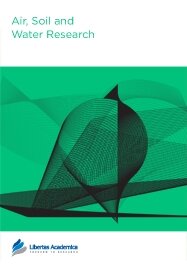

Publication Date: 15 May 2009
Type: Original Research
Journal: Air, Soil and Water Research
Citation: Air, Soil and Water Research 2009:2 31-39

Guoju Xiao1,2, Qiang Zhang2, Runyuan Wang2, Yubi Yao2, Hong Zhao2, Huzhi Bai2 and Youcai Xiong3
1Bioengineering Institute of Ningxia University, Yinchuan, Ningxia Hui Autonomous Region 750021, China. 2Institute of Arid Meteorology, China Meteorological Administration, Gansu Key Laboratory of Arid Climate Changes and Disaster Reduction, Lanzhou, Gansu Province 730020, China. 3State Key Laboratory of Arid Agroecology, Lanzhou University, Lanzhou, Gansu Province 73000, China.
Abstract
In this study, a field experiment was used to evaluate a pea crop (Pisum sativum L.) at Tongwei Experimental Station (35°13′ N, 105°14′E), which is in a semiarid region of China. In this experiment, the mean daily temperature was designed to increase by 0.6–2.2 °C throughout the complete growth stage of the pea crop. When the mean daily temperature increased by approximately 2.2 °C, the water use efficiency (WUE) of the pea crop decreased by 30.4%, the duration of the growth stage was shortened by approximately 17 days, the yields were decreased by 17.5%, the number of stems with root-rot sickness were increased by 50.6%, and the input-output ratio (In/Ou) of the pea crop was 1.20. When the mean daily temperature was increased by approximately 1.4 °C, the WUE decreased by 26.1%, the growth stage duration decreased by 10 days, the yields decreased by 11.1%, the number of stems with root-rot sickness increased by 23.3%, and the input-output ratio (In/Ou) was 1.11. In addition, supplementary irrigation was found to be beneficial to the pea yields when the temperature increased. Indeed, application of 60 mm of supplementary irrigation during the complete growth stages of crops that were subjected to an increase in mean daily temperature of 0.6–2.2 °C resulted in crop yields improving by 8.3%–12.8%. Consequently, in this region, supplementary irrigation may play an important role in maintaining pea yields that would otherwise be affected by climate warming. However, the results also show that application of 60 mm of supplementary irrigation does not decrease the number of stems with root-rot sickness and that the In/Ou ratio of pea crops subjected to the same temperature conditions will increase.
PDF (692.36 KB PDF FORMAT)
RIS citation (ENDNOTE, REFERENCE MANAGER, PROCITE, REFWORKS)
BibTex citation (BIBDESK, LATEX)


As an open access journal with an international audience, Air, Soil and Water Research has a tremendous worldwide impact. Peer reviewing process is essential to maintain the high standard of quality of published papers, and I have thoroughly enjoyed my participation as a reviewer for Air, Soil and Water Research. The online review system is very easy and simply to use. I am looking forward to peer reviewing additional articles in the future. ...

All authors are surveyed after their articles are published. Authors are asked to rate their experience in a variety of areas, and their responses help us to monitor our performance. Presented here are their responses in some key areas. No 'poor' or 'very poor' responses were received; these are represented in the 'other' category.See Our Results
Copyright © 2013 Libertas Academica Ltd (except open access articles and accompanying metadata and supplementary files.)
Facebook Google+ Twitter
Pinterest Tumblr YouTube